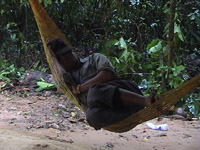Cambodia
Mekong
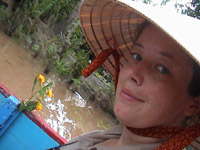 The Southern border with Cambodia in the Mekong Delta has only recently opened up. Until not so long ago it was very much bandit territory with the constant threat of the Khmer Rouge. We'd not planned to visit the Mekong delta, but with this border open, it seemed like a good idea. Besides, I fancied being Martin Sheen travelling up the Mekong into Cambodia to search out Brando - Colonel Kurtz ? la Apocalypse Now.
The Southern border with Cambodia in the Mekong Delta has only recently opened up. Until not so long ago it was very much bandit territory with the constant threat of the Khmer Rouge. We'd not planned to visit the Mekong delta, but with this border open, it seemed like a good idea. Besides, I fancied being Martin Sheen travelling up the Mekong into Cambodia to search out Brando - Colonel Kurtz ? la Apocalypse Now.
After much umming and urring we decided to do a three day tour, concluding that the easier pace would be more healthy than a two day rocket tour to the border.
Another tour, new faces, new characters. Same start, new tour guide. I could be a tour guide here, they always start the same;
"good morning everybody. Welcome to the tour with TNK travel. My name is Marc. Let me spell that. M-A-R-C. Marc. In your language that means Lion. But don't worry, I'll not bite you..."
for this last 'joke' this guide introduced himself as 'Hi' no English meaning, just 'HI' don't think you'll forget that. Just shout 'Hi!'
We are sitting in the front seats. Last on the bus has some bonus points. I look behind us. There is the French girl who looks likes a Mary Quant model from the past. Huge eyes with piercing brown dustbin lid pupils and lengthy straw broom eye lashes thickened and blackened with mascara. Change out of the travelling clothes girl, change into a black and white checked dress and you'd fit like a glove into a sixties picture. And then the two guys that are hanging round her. Not sure what the score is with them, other than them apparently being fused to her like a couple of atoms circling round the big eyelashed nucleus. One positively charge, one negatively. The former a Scandinavian geezer who like us had travelled to Asia on the Trans Siberian. The latter an anally retentive English medical student who seemed to exist to annoy. Harmless, but tedious, making stupid wise- cracks and saying the daftest thing. The sort of person your wife kicks you under the table and gives you that look, 'what is that prat on about now?'
Then there is the Auzzie couple from Melbourne who are teachers, or who were teachers (why do we keep on meeting teachers from Melbourne?) they now run a Backpackers Hostel outside the town and accommodate youth groups and school trips on activity/ adventure weekends. A really pleasant couple, he was of Dutch origin, and despite having spent many years in Australia had clearly never made much of an effort to assimilate an Auzzie accent. His English was thick Dutch, unintelligible on first hearing, far worse than his former countrymen who grow up on a diet of English speaking television and film and are so fluent in Holland... and his wife, well travelled and enthusiastic about life, her eyes sparkled with interest when she heard of our travels. "Just wait when I return to the hostel and some backpacker tells me about how far they've travelled. I will tell 'em about the English couple who didn't like flying and were going to Cambodia from England and then on to India...."
And assortment of other backpackers and an English couple. An English couple from Manchester who appeared at first to be aloof, hard core travellers, the sort who are above the back packing thing. Who do this shit professionally. I read them to be an Irvine Welsh novel without flicking through the pages. Oh, the perils of judging a book by its cover. They were more Graham Green. But it was an easy mistake to make. He's got a shaved head and a hairline beard. A face that lends a thuggish accent to his appearance, reinforced by an assorted medley of tattoos on his bare arms. Nothing particularly artistic. Some Celtic symbols and bands and a number of what look like etchings he'd attempted himself with differing degrees of success. At one of the lunch stops he is sitting next to Lindsey and ponces a glass of water from her bottle. Bloody cheapskate. At every stop he is last to get off the boat- if he can be bothered (we look back and he is sprawled out on the deck, as though he is stoned, suffering the consequences, out of it). And they don't join the group when it goes out in the evening for a meal. And then on the final night they are sitting on the veranda of the hotel, bottle of locally produced whiskey and coca cola and I think yes, I know what you are about. But then I find myself talking to them and I have to hold my jaw up. Mustn't show my surprise.
"So what do you do?" I ask, almost sneering, expecting the answer to be 'nothing'.
"Oh, we are both teachers," he says, "at an international school in China." He is telling me how he has been a teacher for fifteen years, originally an RI teacher (of all things a bloody RI teacher I am thinking), but he is now the special needs coordinator at this International school in China and I am stunned. I'm sorry, I can't remember your names, but please accept my apologies for judging you so badly. Mental note. Don't judge a book by its cover....
The war
What was it all about then? What were the Americans doing in your country? I ask Hi. Three reasons he replies.
1 To support the South Vietnamese government. 2. to maintain its sphere of influence in Asia. 3. To prevent the spread of communism through South East Asia.
It is this last one that with hindsight seems so hard to comprehend. The cold war is over, communism is no longer a 'threat,' the domino theory whereby once one country falls under communism so will its neighbours is history. Yet even if I try and take the scalpel of empathy that was such a critical tool to dissecting history when I studied it at school, I cannot understand what the big deal was. What was the hang up with the Reds? Oh global realpolitik. What a bunch of arse. I'd never be any good at it of course. Shit, I've barely a gram of tact in my body. My first week at work as a consultant and my manager tells me my work is fantastic. Can't be faulted. Never worked with someone so thorough etc. But in dealing with people- I lack tact. So someone had asked me my opinion on a presentation she'd given and I told her what I thought. Nuts and bolts. Bollocks to beating round the bush, gotta tell it the way it is. 'She'd missed out this and that and the way she'd delivered the key messages was lame....' well she had asked.... And it was then that I understood what meant by my key weakness that my father had identified when I filled out an application form for my first job in the bank when I was sixteen. I was stumped. It's asking 'please tell us about your key strengths and weaknesses'. Well anyone can bullshit about their strengths, but weakness- what are weaknesses that can be viewed in a positive light?. And the old man says 'you don't suffer fools gladly.' I didn't know what he meant, but it sounded good. and now I know. Don't suffer fools gladly. And that is why I'd be poor in politics in the traditional mould. ('Tis true there are those that threaten the mould, no more so than our dear Secretary of State for International Development, Clare Short. But somehow you can't see her heading up the FCO, indeed her current role is much about antagonism with the FCO with whom DFID have an uncomfortable relationship like a bickering adolescent brother and sister.
I'm sorry, I'm off somewhere. Now where were we. The Vietnam war. So what if the South had fallen under communism? It was only those in Saigon who really objected to the North and the concept of communism. The corrupt government of the south under a despot supported by the Americans. (Until they realised he was something of a liability and withdrew their support. Cue the murder of Ngo Dinh Diem. and a couple of weeks later JFK is shot and there is another angle for the conspiracy theorists. The gunman in the grassy knoll was Vietnamese, family of Diem....
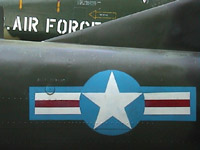 Where am I going with this stuff? I am not a historian. I am not qualified to spout off about it. What I am qualified to do is describe what Hi told us. Hi had the misfortune of being born in Saigon and in college at the outbreak of war. He was conscripted into the South Vietnamese army and served with the Americans. Because he could speak English he found himself as a translator, working with the MID. And he found himself on the battle field with his language skills much in demand when the Americans captured VC. And Hi's experiences bore out the propaganda in the War Remnants Museum, "They would torture them on the battle field. If they lived they'd send them back to Saigon where the South Vietnamese government would further interrogate them", (in the War Remnants Museum there were displays of the 'tools' the South Vietnamese used in their interrogations...)
Where am I going with this stuff? I am not a historian. I am not qualified to spout off about it. What I am qualified to do is describe what Hi told us. Hi had the misfortune of being born in Saigon and in college at the outbreak of war. He was conscripted into the South Vietnamese army and served with the Americans. Because he could speak English he found himself as a translator, working with the MID. And he found himself on the battle field with his language skills much in demand when the Americans captured VC. And Hi's experiences bore out the propaganda in the War Remnants Museum, "They would torture them on the battle field. If they lived they'd send them back to Saigon where the South Vietnamese government would further interrogate them", (in the War Remnants Museum there were displays of the 'tools' the South Vietnamese used in their interrogations...)
"So the Americans tortured the VC?" I asked him,
"Of course. There was this big black fellow and pow! he would kill VC in one blow. American so much bigger than VC". And I thought they were signed up to the Geneva Convention on Prisoners of War. Oh sorry, my mistake, no doubt they'd argue the VC wore peasant garb, not uniform and were therefore not prisoners of war. Yeah, whatever.
"So Hi" I asked, "the torture? Were these official orders?"
"Of course" he replied, "But remember, the VC did the same to us"
"Yeah, but the VC didn't sign up to the Geneva Convention..."
"And let me tell you why the Americans lost the war" Hi went on. "They lost because they didn't want to be here. They didn't want to be covered in mosquito bites, in leeches, wearing heavy flak jackets and combat boots in our heat. Their hearts weren't in it. They didn't want to be here."
And then they left, leaving the South Vietnamese to fight the VC for themselves.
And so by the accident of having been born in Saigon, having been educated and conscripted onto the wrong side Hi suffered the consequences. Saigon fell and Hi left his unit. He threw away his military uniform and walked through the paddy fields back to Saigon.
And spent the next three years in a re-education camp. To tell the truth, without him cooperating with the Americans, he would undoubtedly have seen more years in camps. Hi had to perfect a new life story. He would be woken up at any hour and told to write about himself. Inconsistencies and worse than more years in the camp, he would be sent to a re-education camp up north where the punishment was far greater. The Northerners looked for revenge for the years of Yankee bombing. Hi said in the south, his uncle, a doctor found himself in a camp in the north. He survived the ordeal, but when he was released he refused to work as a doctor in Saigon again, escaping as a refugee like so many others, choosing an overland route rather than the hazardous boats that so many of his fellow countrymen, the Vietnamese boat people had endured.
Package tour of the Mekong
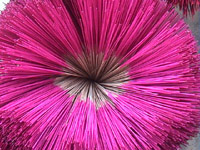 Here we go, a whistle stop synopsis of the trip up (or should that be down) the Mekong. First off a bus to My Tho City then through the Bao Din Canal to a riverside market. On the way to Qui we stop at Turtle Island, seeing a fishing port, stilt houses, boat building workshops... And a rice paper making co-operative. Funny that. I spent a year in Africa working with post harvest agro-processing co-operatives- working with them. And here they are as tourist destinations. Look how they use century old techniques, traditional methods. How are we supposed to feel about what we see? I just see musculoskeletal disorders in the making, occupational injuries and drudgery. ' Look at them making incense sticks' we are told. They can make ten thousand in a day. Paid by the piece. I'm not impressed. I just see pain and discomfort and a need for simple, low cost mechanisation- improved tools to lessen the drudgery, Ergonomics Interventions to improve their quality of life...
Here we go, a whistle stop synopsis of the trip up (or should that be down) the Mekong. First off a bus to My Tho City then through the Bao Din Canal to a riverside market. On the way to Qui we stop at Turtle Island, seeing a fishing port, stilt houses, boat building workshops... And a rice paper making co-operative. Funny that. I spent a year in Africa working with post harvest agro-processing co-operatives- working with them. And here they are as tourist destinations. Look how they use century old techniques, traditional methods. How are we supposed to feel about what we see? I just see musculoskeletal disorders in the making, occupational injuries and drudgery. ' Look at them making incense sticks' we are told. They can make ten thousand in a day. Paid by the piece. I'm not impressed. I just see pain and discomfort and a need for simple, low cost mechanisation- improved tools to lessen the drudgery, Ergonomics Interventions to improve their quality of life...
Then the pig pens and bee keeping. Lindsey sticks her finger into the hive, piercing the honeycomb and withdrawing a sticky finger dripping with fresh honey. The bees seem too mellow and unbothered to sting. Now it starts raining. Tropical rain, monsoon downpour, the shower- head has detached from the pipe in the clouds and water just falls from the sky, pounding the earth as it falls. Pounding us as well. Tarpaulin sheets are pulled down each side of the thin boat but do little to keep us dry. Or keep us motivated. Other activities on the itinerary are ditched and we return to the bus and motor on to a hotel.
Next day. Floating market at Phong Dien. Navigating around the narrow canals around the delta. Long Xuoen and more incense making.
Sam Mountain for Sun set but clouds imprison the Sun and forbid us a view.
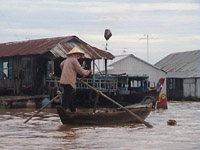 Final day of the tour. Early morning start. Floating fish farms at Chau Doc, thousands of cat fish thrashing about under a floating wooden building. On to a Cham minority village. Minority because the villagers are completely outnumbered by tourists tramping around their huts, sticking their cameras in their children's faces, grabbing a piece of indigenous culture on their handy cams.
Final day of the tour. Early morning start. Floating fish farms at Chau Doc, thousands of cat fish thrashing about under a floating wooden building. On to a Cham minority village. Minority because the villagers are completely outnumbered by tourists tramping around their huts, sticking their cameras in their children's faces, grabbing a piece of indigenous culture on their handy cams.
Now the tour is over. We bid farewell to Hi (ignoring his subtle request for a tip- which I feel bad about, but as we are leaving the country we do not have a bean, or rather a dong left to our name to give him.) We change boats, out of the tiny flat bottomed wooden vessel, (powered by a pretty young Vietnamese woman with a delicate smile and powerful arms, standing up to row us around) and climb aboard a small speed boat. The engine is started, the bow rises and we speed up the river to Phnom Penh.
Currency
The currency of Cambodia is the Riel. Although you could travel around Cambodia and never really become familiar with it or have to change your dollars into it. It is more a currency of change. More often than not prices are quoted in dollars. Where your change is less than a dollar, the difference will be returned in Riel. I hadn't grasped this when I arrived. I tried to change travellers cheques, but was only offered dollars in exchange. In the bureau de change (which also happened to be a jewellers) when I asked for Riel I was greeted by a blank stare. No, this was not possible. Only dollars. Another jewellers and I changed a fifty dollar bill to the incredulous look of the woman behind the counter. Why do you need so many Riel? This was a good question as my money belt bulged.
Dollars were welcomed in Vietnam as well, and I am expecting a similar situation in Laos. Which begs the question of money supply in the US and in how many countries is it's paper money an unofficial daily currency?. What if all those dollars suddenly found themselves back in the States? Do the economists in the Central Reserve wonder where all those green notes they print go to? Does it matter? Not being an economist (despite a half hearted attempt- I took an economics A level course but spent the morning of the exam revising for my psychology exam. missing the economics paper), I am unqualified to answer these questions. Ho hum.
Moto
In addition to trishaws, rickshaws, tuk-tuks, and taxis, another means of public transport is offered around much of South East Asia. The motorcycle taxi- in Cambodia known as the Moto. A grand title for what is no more than a man and his motorbike offering to take you (and others if the price is right) on the back of his bike (more often than not a Honda scooter) to the destination of your choice. Now I wonder what the insurance companies make of this. We are not covered to ride motorcycles (a 'dangerous activity') but we are not 'riding' them are we? We are taking a legitimate form of public transport. We are taking a taxi . All be it with two wheels rather than four. Does it matter that helmets are never provided? What if we were to have an accident. Would the insurance company pay up? The motorbike taxi is the most common form of transport for hire in Phnom Penh. There are four wheeled taxis but they are not in abundance. Outside our hotel a posse of motorbike taxi drivers hang out. The hotel is a three dollar a night chilled out place by the lake. Clean rooms, hammocks, good music good food and the occasional waft of something potent being smoked. And the taxi drivers ask what are you doing tomorrow? Six dollars for the day and I'll take you on a tour of the city. Done. See you tomorrow at nine.
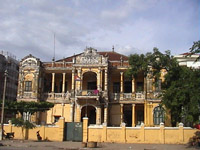 I know our driver immediately. He is the one wearing the England football shirt. Lindsey gets on first and I get on the back. Three on the bike. I'm sure the insurance company would find that a reason for not paying up in the event of an accident. Using a vehicle in a manner other than it is designed for. Something like that. And off we speed through the streets of Phnom Penh. To the outskirts. I assume to the killing fields, but our driver says something else I don't quite hear. But I'll leave the tour to him. He knows the sights the tourists want to see. He takes us to the army base by the airport. To the shooting range.
I know our driver immediately. He is the one wearing the England football shirt. Lindsey gets on first and I get on the back. Three on the bike. I'm sure the insurance company would find that a reason for not paying up in the event of an accident. Using a vehicle in a manner other than it is designed for. Something like that. And off we speed through the streets of Phnom Penh. To the outskirts. I assume to the killing fields, but our driver says something else I don't quite hear. But I'll leave the tour to him. He knows the sights the tourists want to see. He takes us to the army base by the airport. To the shooting range.
AK47
'What are we doing here' Lindsey demands. Good question.
"Please" says the army officer, "take a seat. would you like a soft drink?" He hands me a sheet of laminated paper, "here's our menu." Expecting a menu of drinks and food I'm about to say no thanks but then I see the menu and there is a distinct lack of beverages on it. The highlights of the menu read something like this:
Menu
Semi-automatic (30 bullets)
AK47....$25
M60....$30
Revolver (six bullets)
Magnum .38....$12
Miscellaneous
Hand grenade....$20
Rocket launcher....$200
They've got some serious hardware lying around here. hey! twenty dollars to chuck a hand grenade!! Apparently pay a little more and they'll provide a live cow to blow shit out of with your rocket launcher. But take care- the planes fly overhead on their way in and out of Pochentong airport.
A couple of gung-ho Americans turn up and go for the AK47. And I sit, toying with the menu, deep in thought. The conscience is in turmoil.
1. The Rambo in me speaks first. Go on- you know you want to. A-kay-forty-seven. Pow pow pow.
2. Next up is the pacifist. Peace man! guns ain't nothing but trouble. Don't condone their use by firing one now.
3. Then the politician. You shoot and you'll be no better than a right wing, gun totting firearm loving, sad looser. You don't really want to be like Charlton Heston do you? Spit...
4. The economist. Twenty five dollars for three seconds of pleasure?! Are you mad?
5. And finally the husband. "Guns aren't toys Marc, they're not to be played with, they're evil. It's a waste of money. You can do what you want, but I won't be happy".
So that settles it. And then I said something flippant but serious. Something that rattled my mind with its poignancy. Here we are in the shooting range, targets in the shape of humans. It is time to leave.
"Take us to the killing fields driver!"
The Killing Fields
I can remember Blue Peter and an Annual appeal for Cambodia and I think it was Janet Ellis talking about the evil regime of Pol Pot and even though I can't have been more than ten at the time the country of Cambodia stuck in my mind as a place of horror and utter despair. And then there was the film 'the Killing Fields' and the horror is on celluloid. And now we are at Killing Field of Choeung Ek and the horror is real. A one time orchard, between 1975 and 1978 something like 17,000 men women and children were executed here.
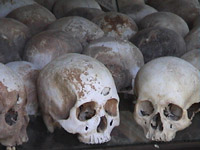
We are walking around one of the killing fields and there are the pits, the mass graves that have been exhumed and rags half submerged in the bone dry earth. By a tree a pile of bones. Big bones, leg bones, arm bones. A tree that the Khmer Rouge butchers swung babies at, held by a leg, smashing their tiny skulls against the trunk. They didn't want to waste bullets. Walking along the path in silence, trying to absorb the horror of this place. Head looking down. Lindsey spots something on the path, a molar tooth. A closer inspection reveals it is attached to a jaw. Horror. A stupa containing over 8000 skulls and the remains of thousands of those murdered by the Pol Pot regime. For what? for being academics, doctors, students, enemies of the Khmer Rouge. Man's inhumanity to Man. but strangely this is not so perceptible here. This is the end rather than the means, and they speak little of the means. For that we had to go to Tol Sleng, Security Prison 21 (S21).
S21
An anonymous school in an anonymous street in Phnom Penh. A concrete building which could be a school anywhere. It was a school until 1975, until the Khmer Rouge forced the entire population of Phnom Penh to leave the city, and marched them out to the fields for a terrible social experiment. And then in 1975 the school was hastily converted into a prison. Over the next three years it was an anonymous witness to torture and barbarity before transport to the extermination camp at Choeng Ek. And there a silent witness to death- at the beginning of 1977 killing an average of 100 victims every day. It is now a museum, remaining pretty much as the Khmer Rouge left it. A testimony to the brutality of their regime. The means to the end we saw in Choeng Ek.
In one building, what were once ground floor classrooms, were repurposed to be interrogation rooms. Desks and chairs replaced by single metal framed beds with leg irons and shackles cast around. And on one wall in each room a large grainy black and white photograph of the room in use. A body on the bed, on the floor, still shackled, in pools of blood, mutilated. Horror.
Another block. The ground floor rooms housing the photographs of detainees who found themselves in the prison. Like the Nazis in the concentration camps, the Khmer Rouge kept meticulous records of their prisoners. And the photographs, record their despair. The faces; eyes full of fear and terror. Another room, leg shackles; dozens of them on a single metal bar the length of the room. What evil happened here?
Above, tiny cells. First floor; cells, partitioned with wood. Second floor; cells partitioned with brick walls. Shoddy brick walls, no straight lines, no attention paid to neat mortaring, clearly not laid by bricklayers, laid by unskilled prisoners whose only crime was to be educated?
The third block contained items of torture and illustrations of how they were used. A shiver runs down my spine. And we leave. The horror.
Draft beer and ex-pat spotting in Colonial ambience
In the bubbling stew of Phnom Penh, the city has a hint of decaying wild west flavouring to it. A marinade of danger, a strong seasoning of decadence, a pinch of debauchery, a faint aroma of the past. Maybe a past it never had. From 1975 to the early nineties when the UN descended to arrange elections, few foreigners entered the country. Could it be catching up on lost time, are those missing years now...?
In search of the nightlife we start at the Foreigner Correspondents Club (FCC). A large first floor bar in an old French colonial building. Obscenely high ceilings, open verandah, a certain airiness to the place. And a collection of characters whose appearance speak of their ex-pat status. Surely this would be a good place to be an ex-pat.
Lindsey and I had a disagreement on the moto getting here. Looking back on it a mildly amusing affair, having the row on the back of a moto, the driver listening to the two of us squashed behind him bickering and arguing about how long we should keep him for the night. I wanted it to be a big one. Get him to wait for us then take us on to a club. Let's go dancing. Lindsey was more conservative and didn't fancy the clubbing part. Wha! See you in an hour my man, five dollars for the night! They say keep your moto driver, don't risk finding a new one in the early hours- could find a gun in your back...
Ankor beer draft on tap. And a rum and coke for the lady. Same again please barman, I've got the taste. Better still, Lindsey has got the taste. 'Better go and tell the moto driver we'll be out late tonight.' Alrighty.
"The bloke sitting next to us, bet he's an ex-pat".
"Why do you think that?"
Look at what he is wearing. Look at his manner. Got it written all over him. I know his sort from my time as an ex-pat in Ghana. You watch. Expat. Dead cert. I'm going to ask him".
"No don't"
"S'cuse me mate, d'you work here?"
"No, I work in Dubai. Why d'you ask?"
"Well if you worked here I'd've asked you where the good clubs are in town".
"Sorry mate, can't help you. Good beer here though, and the steak and kidney pie is the best outside the UK"
So he wasn't a local ex-pat, but an ex-pat all the same. The tell- tale signs are an aura of comfort and resigned disposition that tourists just don't have. Clothes that are worn clean and pressed. Often western clothes- the tourist's wardrobe is chosen for the holiday, or created on the trip to assume the hippy look or whatever. For the tourist every day is an adventure. For the ex-pat it is another day at the office. Assuming the ex-pat is not one of the rare types that relish long periods of time 'in the field'. "Am I boring you?" I ask Lindsey, "with my musings on the ex-pat lifestyle?" "No. But I will have another rum and coke. and that Pizza looks and smells good". We are propping up the bar, I've stopped asking for refills to my glass. The barman does it automatically. But Lindsey has to ask for another spirit. And the pizza. The woman sitting beside us at the bar has been chomping away on this pizza and it does indeed smell good and wha!, why not! This is turning out to be a splurge. blowing our budget (again) this time on booze and pizza. Gonna be a twenty quid night this....
You starting? The Heart of Darkness
We don't stagger out of the FCC, we're not that inebriated, but we are well on the way. Back on the moto, holding on tighter this time, gently swaying to the boozy tune of alcohol jiving through my blood stream. Someone mentioned a decent club that plays house music. The moto driver knows it and we are on our way. Here it is. All's quiet on the western front. We go in. Empty. Good tunes, but only a barman and a DJ to enjoy them. I ask the barman if it is likely to get busy. He smiles, '"only at weekends." It is Wednesday night, 11pm. I apologise and refuse his offer of a drink. We march back to the moto. "So my man, where's good in this town?" "Heart of darkness."
"What are we waiting for. Let's go!"
An intimate bar, in stark contrast to the FCC with it's bright airy ambience, the Heart of Darkness is small and poorly lit. A different kind of atmospheric. No dancing- the dance floor at the back is closed we are told- but we don't fancy tearing round town again on the back of the moto, so more drinks glide down the gullet.
Looking around I see the clientele is predominantly male. A fifty-something year old man dressed in hippy garb, with a receding hair line at the front and greying dreads hanging from the back. dances to the music in one corner. That stoned dance whereby the feet are rooted to terra firma, the upper body sways, the outstretched arms sweep slowly around and his glazed eyes focus on nothing and everything. In another corner a couple of loud Americans who we'd seen earlier in the FCC. Lindsey had pointed them out to me. They were with a couple of Cambodian women, their body language spoke not of friendship but of employment. The women were surely prostitutes. But the men are alone here. And now one of them is approaching me, he is speaking to me. I don't get what he is saying over the music.
"Sorry mate, say again..."
"How d'ya manage to get 'er in 'ere?" he laughed and walked on by before what he said registered. I'd been a pacifist earlier in the day at the shooting range, but now fuelled by the beer the Rambo in me started to tremble in anger.
"Talkin' bout my wife like that. Who the fuck does he think he is. I'll knock 'is fuckin' block off..." Or something like that. Lots of aggression and lots of obscenities and expletives and Lindsey tells me to shut up and not be so rude. Besides, he's bigger than you. And you are drunk. Wha! The moto driver appears by the window. Which was probably rude of him, he clearly wants to call it a night- but we'd not said to him that it would be a late one....
"home James!"
"But my name is not James. It is Pran"
"Sorry Pran, back to the hotel."
The streets are almost totally deserted. We feel as secure as you can clinging two behind the driver on the sliver of seat on a Honda moped. Is it safe? Ask Lonely Planet. 'There is no need to be overly paranoid, just cautious. Driving your own motorbike late at night is not a good idea and even on motos it is better to stay in pairs in the early hours'. And then further, 'armed theft does occur, so it is not sensible to ride a motorcycle alone late at night'. Lindsey hadn't read that thank goodness. No paranoia, caution thrown to the wind. A lone moto with two farang Speeding through the streets, fuelled on booze and fatigue. Wha!
Space Cab to Battambang
The tourist circuit of Cambodia is pretty much Phnom Penh - Siem Reap for Ankor Wat. I wanted to get off the well trodden tourist trail to get a feel for the Cambodia that doesn't thrust objects into your face with the mantra 'good price sir!' Lindsey wasn't up for hiring a motorbike and heading down south, the main attractions down there being beaches ("we'll get beaches in Thailand") and Bokor Hill station, according to Lonely Planet 'known for its secluded waterfalls and jungle vistas... and the old hotel and casino, the Bokor Palace is straight out of the Shining...' ("I don't think so Marc"). But Lindsey did not object to an excursion to Battambang.
Battambang, pronounced batten-bong (no one seemed to know what I meant when I used the 'bang' ending), is North East of Phnom Penh and south of Siem Reap. Whilst Seam Reap is reputed to take nine hours by pickup (the boat is a prohibitively costly $25), Battambang is only seven hours. Less travel time and Lindsey was sold on the idea. Then she saw the means of transport.
No busses ply the Phnom Penh- Battambang route. Only taxis and pickups. the latter are recommended because they are four wheel drive and have a high ground clearance. Taxis are just not built for the roads outside of the cities. If you can call them roads. But more of that later.
You have two choices. For two dollars you can travel in the back of the pick up, or for five US dollars you have the luxury of travelling in the front 'Space Cab'. We chose the luxury option of the Space Cab. Ha! now there is misnomer. Behind the driver and passenger seat is a bench seat with limited leg room, they call additional space in the front cab. Additional space for two passengers, three at a tight squeeze. But this is Asia and the pick up doesn't leave until there are four of us on the bench seat. You think the front seat may be more comfortable? think again, two people are squashed on each others laps on the passenger seat. People don't mind getting familiar with each other here. Familiar with all the senses. Deodorant is unheard of in these parts!
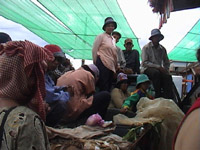 But at least we have air conditioning and a roof over our heads. In the back of the pick up the passengers are open to the elements. When it starts raining a tarpaulin is pulled over their heads, but it does little to keep them dry. The 'them' is an incredible twenty adults and their luggage of sacks of rice, boxes of tinned produce, bags of personal affects (plus two bulging rucksacks of the two farang in the front). Twenty adults squashed on top of each other.
But at least we have air conditioning and a roof over our heads. In the back of the pick up the passengers are open to the elements. When it starts raining a tarpaulin is pulled over their heads, but it does little to keep them dry. The 'them' is an incredible twenty adults and their luggage of sacks of rice, boxes of tinned produce, bags of personal affects (plus two bulging rucksacks of the two farang in the front). Twenty adults squashed on top of each other.
Yet this is probably considered a comfortable number. On one pick- up we passed, a passenger sat on the bonnet, clinging onto the mirror. This on the pot holed roads with the young driver in a hurry.
As on a bus you have a driver and a conductor, so what do you have on a pick up?. On a bus the conductor does not wear a motorcycle helmet, the fully enclosed one with shiny visor. A skinny, stick like figure with this enormous bulbous white shiny helmet on his head. He sits on the roof of the cab, clinging onto the roll bar in front of, above and in stark contrast to the crammed passengers heads exposed, or covered with the chequered Khmer scarf, the kramas in the back.
Not long out of Phnom Penh and the road ceases to be worthy of that title. Pot holes devour much of the surface, and where they are conspicuous by their absence, as vehicles pick up speed, the surface turns to a washboard with saw-tooth ridges shaking away any passing thought of comfort.
Uneven oscillations numbing the bum
I can't claim to be the slimmest of people, indeed it may be said that I have rather a large arse. Now you may think this would serve me well, sitting on this bench seat that is barely more than a plank of wood with a veneer of padding on it. All that spare flesh on the botty should absorb the bumps and vibrations and pain and discomfort that a skinny rear end would feel. But you'd be wrong. Twenty minutes of being thrown about and gravity has worn the arse out. I can now feel my pelvic bone crunching on the surface. Man, I've got a sore arse! My legs aren't much better. I am responsible for us taking this trip so I try to ensure Lindsey is comfortable. She sits by the window. Together with a Cambodian student I sit above the mound that houses the drive shaft. To the right of the student a larger than average Cambodian gentleman sits (and sleeps throughout the journey) claiming what I would consider to be more than his fair share of the seat. With limited room to move the legs they become cramped and sore and a cause to consider moaning. Yet I dare not moan. For two reasons.
(1)
The stereotype of the winging pom is too true. And to hear it is both distasteful and furthers the stereotype. And
(2)
I am forever chastising my wife for whinging. It is one of her not-so-good, yet typically English points that we tend to disagree on. So I hold my tongue, then look back out of the window at the rear of the cab and see the huddled masses in the back of the pick-up. It is pouring with rain and they are getting soaked and they can't move because to move may mean loosing that inch of rice sack that is the seat that you covet... And now thoughts of discomfort are sidelined by a new line of thinking. What is going on here? The bridge is down and vehicles are leaving the road, down the siding and driving through the paddy field, across the stream, and into the mud. Getting stuck in the mud. Thank goodness we didn't take a taxi. With their low clearance half a dozen saloon cars sit, bogged down in the thick beige mud. The drivers drop the clutch but the wheels just turn and turn, spraying mud and bogging them down even further. People run about in the downpour, the occasional curse as someone gets coated with mud from walking behind a car that tries to extricate itself. Pickup conductors, still with their bulbous helmets on direct their pickups through what they consider to be the easiest,, least hazardous route. Our driver revs up and, foot to the floor climbs the steep bank on the far side of the stream. He clears it but takes it too easy when he gets there, too slow, insufficient momentum and we also are stuck in the mud.
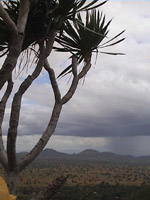 We watch all this from the now confirmed comfort and luxury of the air conditioned and dry space cab. The passengers at the back are jumping out of the back and pushing us. It was always going to happen, someone was going to stand too close to the rear wheel. Mud now clings to his already sodden shirt and dirties his face. Already running down as the deluge from above rinses him down from head to knee (can't use the expression head to toe because he is ankle-deep in mud). And then we are back on the potholed road and the thoughts of discomfort return again....
We watch all this from the now confirmed comfort and luxury of the air conditioned and dry space cab. The passengers at the back are jumping out of the back and pushing us. It was always going to happen, someone was going to stand too close to the rear wheel. Mud now clings to his already sodden shirt and dirties his face. Already running down as the deluge from above rinses him down from head to knee (can't use the expression head to toe because he is ankle-deep in mud). And then we are back on the potholed road and the thoughts of discomfort return again....
Until we arrive in Battambang. Nine hours after leaving Phnom Penh.. What was supposed to be easier and quicker than going straight to Siem Reap has been far from it. Sore limbs, tired and cranky we jump on a moto and find a hotel.
Rodney you plonker
We check into the Chhaya Hotel in the centre of town. I'm filling out the form and I come to a line item I am unsure of. "Weapons." I write 'none' and enquire if many people come to the hotel with weapons.
"Oh yes, many Cambodians come to hotel with weapons. They write down what the weapons are and we keep them down here for safe keeping."
" What sort of weapons?"
"Oh you know, guns knives. But we keep them locked away"
"Good, that makes me feel much better." In the reception area a dozen men hang around watching a movie on a tiny television screen in the corner. I later learn that they are all moto drivers. One of them approaches me. He looks at the form I am filling in and sees that I am from England.
"Aw-wight geezer!" A Cambodian putting on a cockney accent. I think. "Sorry?" I say, not entirely sure I heard him correctly the first time.
"Diamond geezer! D'ya get 'ere in a jam jar?"
"urr, car, no pickup, urrr, you know cockney rhyming slang?"
"Apples and pears, frog and toad, Rodney you plonker!"
After a marathon ride of discomfort this was all a bit of a shock. "So you've seen Only fools and Horses?" I asked him.
"No" he replied, "tourist from London teaches me it". His name is Trun. I tell him I will help further his cockney education tomorrow if he wishes.
"Lovely jubly mate. We'll have an excellent knees up!" he replies. Another incongruous moment, a Cambodian cockney. Another smile on our faces.
The blood of innocents makes killing easier
Cockney geezer is nowhere to be seen the following morning. There are still a dozen moto drivers sitting around, eyes still glued to the telly. A small roly-poly man approaches us and offers to take us on a tour. OK, he calls his mate over and off we go. I'm with Char, Lindsey is with Sim. We ride out of the town and into the countryside, dotted with tiny hamlets, wats and parched rice fields that are thirsty for water.
"The rains haven't come. If they don't come in the next week or two the crops will fail" says Char. We pass the odd vehicle, mostly ox and carts, bicycles and motorbikes. Several four wheel drives speed past us engulfing us in a thick cloud of dust. The stickers on their sides announce the organisation and on the back in big letters 'DEMINING.' ("What does that mean" asks Lindsey, reading it as dem-ining. An easy mistake to make I suppose! ) There are still many mines in this area. Our trip takes us out to a monastery on the top of a hill and another killing field.
"What happened in this place Char" I ask. "Terrible things". We are in front of a pile of skulls.
"They kill by suffocate you know. They put plastic around the neck." He points to a bronze vase with a lid on it, "You can see the small pot, they keep the blood of beautiful Khmer girl. Because the soldier, they think that the blood of the beautiful Khmer girl- they take the blood and mix it with the wine and it makes them strong; easier to kill the other people."
"They kill educated people. They kill people with glasses. They know who is educated because they get people to climb up palm trees. Farmers can climb up palm trees but educated people cannot."
There has never been any real justice for what happened in Cambodia. It's recent history is ugly, from Nixon and Kissinger's 'secret war' and indiscriminate bombing of the neutral Cambodia, the evil of the Khmer Rouge; then their overthrow by the Vietnamese and the continuing support of the guerrillas, including the Khmer Rouge by Thailand and the West, against the red threat of a Vietnamese backed Cambodian government. Then the UN backed elections, in which the Khmer Rouge were invited to play a part, through to the 'defection' of Ieng Sary one of the architects of the Khmer Rouge regime, to the Cambodian armed forces in 1996 which significantly weakened the organisation. Sary still controls Pailin, a town whose citizens number countless executioners and murderers; genocidal killers freely walking the streets. "Don't go to that place" says Char.
Corruption
There is a history of corruption in Cambodia. An odious stench that keeps the country on its knees. Char tells us that unlike Thailand, where the people are corrupt but the government is honest, in Cambodia the people are honest but the government is corrupt to its core. This had crossed my mind as we drove up to Battambang. Through every town of any size, every hundred meters or so sign boards on metal posts for the ruling party lined the road as common as though they were displaying the speed restriction. Opposition party signs were much, much more infrequent, and mounted on wooden, rather than metal posts. Char told us of election fixing. If you are unfamiliar and uneducated with the concept of anonymous voting it is easy for the headman of a village to force you to vote in a particular direction. The international observers just see what goes on at the polling stations, but the real vote rigging goes on in the hearts and minds.
Char told us he was a school teacher. He is paid $25 a month, barely enough to subsist on. And so he tops up his salary with private tuition. And 'fees' for teaching each day,
"100 riel- only for those that can afford it. Of the thirty pupils, twenty pay me." Is this not also corruption" I thought, but didn't ask. And now, in the holiday period he drove a moto and made rich pickings from the tourists passing through Battambang. One blessing that the years of strife gave him- as a refugee he learnt English in a Thai refugee camp before returning to his home town. His excellent English went some way in helping us begin to demystify Cambodia.
The beer ladies
That night Char and Sim took us out to a restaurant - reputedly the best in Cambodia- on the outskirts of town. A waiter saw us to the table then no sooner had our bums touched the wooden slats on the seats, than a posse of scantily dressed women swarmed around us. Seven of them. Beautiful Cambodian women, pretty faces, long jet black hair, even longer toned legs and skirts with hem lines floating closer to the end of their hair than the tops of their knees. Skirts that were part of the uniform. The uniform of the beer lady. We are sitting trying to look at the menu and Miss Heineken in green is trying to outmanoeuvre Miss Stella in the Red. Miss Tiger in the blue tries to outflank them both whilst Miss Ankor holds her ground, waiting for her moment. She knew from the start that I'd be hers. She looks at me and nods. I nod back, we speak an unspoken common language. I'll be drinking her beer tonight. You see I'm wearing a bright yellow tee shirt with a screen printed Ankor Beer label covering the front!
Whilst her defeated competitors slink off into the beer garden, she goes and returns with a large ice cold bottle of the local brew and sugar coated peanuts.
There are two postscripts to this story, about the tee-shirt and about the Ankor Beer Lady. It seems an almost de rigueur backpacker uniform, that of the beer tee shirt from each South East Asian country visited. A must is Tiger beer in Vietnam, Ankor Beer in Cambodia and Beerlao in Laos. A possible exception is Thailand where the Red Bull tee-shirt seems to be in vogue. And here I am wearing said backpacker uniform. Woe is me! The second postscript is about the Ankor beer lady. She returned to the beer garden to join the other beer ladies. Little surprise as to what they were doing- the apparently number one leisure pursuit in South East Asia- karaoke. Sadly Miss Ankor took this most seriously, warbling into the microphone ad nauseum. To such an extent that she neglected her duties and ignored my frantic waving for another beer. Because she was 'mine' none of the other brands would approach me. And so it was a one pint night (which made a pleasant change. Been drinking a bit too much recently!)
Could we be cruising the broads?
We were told to be ready to leave the hotel at 7:30. It was 7:15 and we were waiting for our breakfast to arrive and a man rushes up to us and tells us we must leave now. I remonstrated.
"But the manager told us the bus leaves at 7:30"
"The boat leaves at 7:30." He was adamant, taking his authority from an unknown voice on his walky-talky. On every floor of the hotel an employee lurked, looking bored with the single excitement of the walky-talky in his hand. Combined with the request to leave weapons at the desk, security guards on each floor gave the hotel a certain dangerous feel to it. Probably a remnant of its past history. It was constructed to house the UN international observers for the elections. Once a job has been created, it is hard to let it go.
Experience has taught us that it is imperative to leave ample time for breakfast in the morning. Even something as simple as processed cheese (still in its wrapper) with a bread roll and cup of coffee can take twenty minutes to arrive at the table. So we now allow at least half an hour for the most simple of breakfasts. And this morning even that wasn't enough. We left the restaurant hungry, imagining what the cheese and bread and coffee would have tasted like.
Naturally the bus left the hotel later than the 7.30 time the manager had told us. We were taken to the banks of the river and boarded a small fibreglass boat with a large powerful outboard motor. There were six of us plus the driver. All residents at the hotel, so we were unnecessarily denied our breakfasts. Before the boat departed I grabbed some bread from a small stall and a couple of bottles of water and we would do breakfast al fresco.
The Sangker River meanders through the fertile countryside from Battambang, emerging at the south of the Tonle Sap lake. A lake big enough that you cannot see the far shore. It feels like the sea. Siem Reap, the base town for the Temples at Ankor lies a short distance up another smaller river feeding the lake to the north. From Battambang to Siem Reap takes about four hours by speed boat. Significantly quicker (and more comfortable than taking a pickup on the shockingly surfaced roads; even more so than taking a slow boat down the river (which would have had the comfort of spending the entire duration of the trip supine in a hammock).
We speed through the landscape and I am thinking that it could almost be that of the Norfolk Broads. The same river lining of tall reeds and grasses... but whilst the river craft on the Broads are narrow pleasure cruisers full of tourists, here they are rowing boats and large wooden tugs with chugging engines, and people lounging on hammocks strung across the beams that support the palm roofs. Of course the weather here is significantly hotter than on the Broads. The houses are different here, simple open fronted bamboo huts on high wooden stilts. And in Norfolk you don't cruise past well tended plots of cannabis; large fields of ganja being cultivated side by side with more legal crops such as cassava and rice. Nor in Norfolk do you see red signs by the side of the river with a skull and crossbones warning you of mines- Keep out! Although in my opinion such signs would be well placed around Great Yarmouth!.
The banks of the lake are invisible. The water level is high, trees grow out of the water, orchards and tall grasses instead of a clearly defined shoreline. There is a small gap in the grasses which we speed through, barely enough space for the craft to pass. we have to turn our faces away to prevent them being whipped by intermittent grasses arching over the encroached river. Another craft approaches ours. There seem to be no rules of the river here, no universally understood law that states boats will pass to the left of each other. It is more a hit and miss affair, a game of chicken only decided at the last minute, guessing which way the other craft will veer. There is barely enough room for our boat. It is going to be a tight squeeze. The driver at the back jolts the outboard to the left and we narrowly swerve to avoid the oncoming speedboat, similarly laden with tourists. The reeds slap my face and Lindsey has kittens,
"Did you see how close that boat was? I told you I don't like boats. "
"Not much further now dear." sometimes I amaze myself at how much of a browbeaten old married man I can sound, "almost there my dearest."
A tedious few paragraphs that I apologise for in advance...
It is raining when we arrive at the hotel. Heavy, tropical rain. The sort that hurts when it pounds your head, and soaks you within seconds of stepping into it. This prevented us from venturing out to the ruins. So we just sat under the verandah that was the restaurant and ate and talked and reflected on the grumpiness of the people hanging around the hotel.
Mr Chen, the manager at Hotel Chhaya suggested that we stay at the Victory hotel in Siem Reap and arranged for a couple of moto drivers to pick us up from the boat.
"It's a good place" he said, "run by my brother". Unlike the helpful and friendly Mr Chen, his 'brother' was surly unpleasant and rude. I doubted he was Mr Chen's brother, he looked totally different. Mr Chen was a thin skinny man with quite Indian features. This man who would not tell me his name had a rotund pockmarked face with a furrowed brow and a menacing scowl. He was greedy, demanding payment up front for everything. He wanted to know how we were getting to Thailand. "I will organise your bus there" he said. "Twenty dollars". Later, when I booked the same bus tickets in town for twelve dollars he raised his voice at me. "Why have you bought your tickets in town? Why have you not bought them from me?"
"Because in town they weren't trying to rip me off".
He wasn't just miserable to his guests. Worse, he intimidated the people who worked for him. Se, the moto driver who took us round Ankor was deeply upset that I hadn't bought tickets from this man. "He will be angry with me. I am supposed to get you to buy tickets from him. Why you buy them in town?"
"Because Se, they were cheaper in town"
"But in the hotel they can make you good price, same as in town".
"But I have already bought the tickets. And I didn't have to go through any nonsense of haggling."
"We take them back to where you bought them in town and buy them for same price in hotel. That is good no?"
"No Se, that is not good. I am not taking them back, I am not dealing with that miserable man in the hotel." Se looks upset and it saddens me that he will probably be bullied by the manager when we leave.
In the few days we stayed at the Victory hotel we heard several guests complaining amongst themselves about this man. And on the day we left a couple of Englishmen who were leaving on the same bus as us went up to him and said "someone has been into our room and stolen all of our dollars" and he shrugged his shoulders and said "I don't believe you. You have lost your money yourselves." The Englishmen remonstrated with him but he turned his back on them. And what were they going to do? They had tickets on the bus that was about to leave for Thailand. It was not worth staying and arguing and taking it up with the police who anyway are corrupt all for the missing sum of sixty dollars.
We sat in the hotel restaurant and other tourists joined us. There were just two tables and both were long refectory style meaning privacy was impossible and conversation would be inevitable. Sarah from London, travelling with her South African boyfriend was the first to join us. She talked and talked and her conversation was vacuous but passed the time. She had just bought a house in Streatham with her brother. Her lazy brother who was making no effort to find a lodger to rent out the third bedroom whilst she was away. And so she moaned about money and her mortgage and her brother. Then she moaned about house prices and her job; sick of being a recruitment consultant she wanted to become a teacher. And she moaned about the grumpy manager and we joined her in this.
And then Jed joined us, a tall skinny 24 year old Australian with wild beady eyes sunken into an unshaven angular face. In a flash of inspiration in Chang Mai in the north of Thailand, Jed had bought a bicycle and decided to ride it around south east Asia. He was looking forward to cycling around Vietnam. "Have you got a helmet?" I asked. "Nope" he said. "You ought to get one if you are going to Vietnam" I said, "Lots of death on the roads there" and I told him about the accidents we had seen and the blood and the dead bodies. Opposite him was a fat American woman who was from Detroit and didn't talk much other than to give Jed positive encouragement after I had so tactlessly told him of the dangers ahead. She annoyed me this American woman. "You can try and put a rosy picture on whatever you want" I said to her when she accused me of exaggerating and fear mongering, "but I'll say what I saw and that is that Vietnamese roads are crazy places and you wouldn't get me on a push bike without a helmet over there".
Ankor
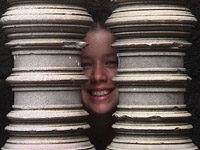 The temples of Ankor rising up from the jungle are one of the wonders of the world. Built around 700-1100 years ago, they are monuments of architectural genius. Look at the crap going up in London and you realise that when past civilisations got their building right, they got it spot on right. Something our civilisation struggles with. The temples cover a large area, and there are over a hundred of them in various states of decay, ruin and restoration. The easiest way around them is to hire a motorbike taxi for the day. Se and mute friend who had taken us to the hotel got the job.
The temples of Ankor rising up from the jungle are one of the wonders of the world. Built around 700-1100 years ago, they are monuments of architectural genius. Look at the crap going up in London and you realise that when past civilisations got their building right, they got it spot on right. Something our civilisation struggles with. The temples cover a large area, and there are over a hundred of them in various states of decay, ruin and restoration. The easiest way around them is to hire a motorbike taxi for the day. Se and mute friend who had taken us to the hotel got the job.
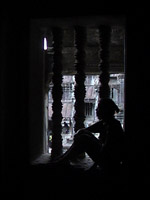 It costs twenty dollars a day to get into Ankor. Forty dollars for a three day pass. We opted for one of these; a laminated ticket with our photograph attached. And at the bottom the clause that states that this ticket remains the property of the hotel. Hmmm, not of the organisation that helps restore or maintain the monuments. Interesting. "The money goes to a Vietnamese oil company" Se told me.
It costs twenty dollars a day to get into Ankor. Forty dollars for a three day pass. We opted for one of these; a laminated ticket with our photograph attached. And at the bottom the clause that states that this ticket remains the property of the hotel. Hmmm, not of the organisation that helps restore or maintain the monuments. Interesting. "The money goes to a Vietnamese oil company" Se told me.
"What, not to the upkeep of the monuments" I say,
"No. I tell you, our government is very corrupt." I do some research into this and discover that he is almost right. The money does go to an oil company- the Vietnamese bit is added for effect- there is much animosity towards the Vietnamese. The government awarded a contract for collection of money at Ankor to the oil company several years ago for $1,000,000. This is a company that has close ties with the government. Given that Ankor sees hundreds, if not thousands of visitors each day paying twenty dollars, this represented a staggering rip off to Ankor and loss of revenue for the upkeep of the monuments. The contract was subsequently renegotiated but still, only sixty per cent of the entrance fee goes to the upkeep of Ankor. Forty per cent ends up in the hands of a privately run company.
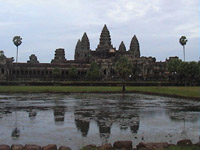 With three days we decided to take it easy. However my natural impatience dictated that we watch the sun rise over Ankor Wat, the most famous of the temples, on the first morning. Hardly surprising to note this was another sunrise that failed to occur. The affair concealed by a filthy grey wall of cloud. Ho hum. Lindsey was not amused- mornings are not the best of times for her, and getting up at five is the best way to see the grumpy, cranky, miserable side of her!
With three days we decided to take it easy. However my natural impatience dictated that we watch the sun rise over Ankor Wat, the most famous of the temples, on the first morning. Hardly surprising to note this was another sunrise that failed to occur. The affair concealed by a filthy grey wall of cloud. Ho hum. Lindsey was not amused- mornings are not the best of times for her, and getting up at five is the best way to see the grumpy, cranky, miserable side of her!
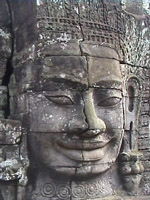 The Bayon was particularly impressive. A structure that looks rather ordinary from ground level, but up close on the third level there are enormous faces smiling down at you. Four sides, four cold sneering smiles on 54 towers. More than 200 smiles.
The Bayon was particularly impressive. A structure that looks rather ordinary from ground level, but up close on the third level there are enormous faces smiling down at you. Four sides, four cold sneering smiles on 54 towers. More than 200 smiles.
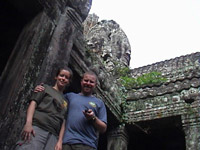 My favourite temple was that at Preah Khan. Not one of the must-see temples but this added to its attraction. Still much of it is in the hands of the jungle. The roots of huge trees strangling the stonework, crawling around the masonry, finding gaps between stone blocks and becoming entwined in the fabric and structure of the building. Slowly, much of it is being restored (by a US NGO), but half of it is left to the jungle. Eerie corridors of moss covered stone and a green canopy where the stone roof has fallen through. We visited this place twice, the second time in the rain that just added to the other-worldliness of the monument.
My favourite temple was that at Preah Khan. Not one of the must-see temples but this added to its attraction. Still much of it is in the hands of the jungle. The roots of huge trees strangling the stonework, crawling around the masonry, finding gaps between stone blocks and becoming entwined in the fabric and structure of the building. Slowly, much of it is being restored (by a US NGO), but half of it is left to the jungle. Eerie corridors of moss covered stone and a green canopy where the stone roof has fallen through. We visited this place twice, the second time in the rain that just added to the other-worldliness of the monument.
On our way back to the motos a policeman approached me, conspiratorially beckoning me over. Looking left, then right with a face that suggested that he was about to break the law (yet he was the law) he reached into his pocket. He pulled out his wallet flipping it open as they do in the films to show his badge. "Souvenir" he says, "Four dollar". "What? You trying to sell me your badge?"
"Four dollar. Good souvenir" "No thanks" I reply.
"OK then, three dollars."
"And what would I do with it. Whip it out when I meet people and pretend I am in the X-files. 'Fox Mulder, FBI Ma'am'?" I walk away with his "good souvenir, three dollars" ringing in my ears. What are you to make of a country where the government sells the rights to collect money from tourists to its premier attraction- one of the world's greatest tourist attractions- to an oil company, and policemen try to sell you their badges?
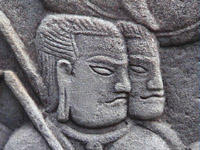 I sit behind Se as we speed around the monuments. Se hollers to me, telling me stories. At first I think it is starting to rain, but then I realise that the drops of water correspond to Se shouting. He tells me how he is forbidden from accompanying us into the monuments themselves- he is just a taxi driver. Yes, he knows about the monuments, but to go in with a Farang, a Westerner he must be a qualified guide. To be a guide he must take examinations and this costs money. "After paying all the people it will cost more than $1000. And I don't have this sort of money. I am still paying my uncle for helping me buy this moto."
I sit behind Se as we speed around the monuments. Se hollers to me, telling me stories. At first I think it is starting to rain, but then I realise that the drops of water correspond to Se shouting. He tells me how he is forbidden from accompanying us into the monuments themselves- he is just a taxi driver. Yes, he knows about the monuments, but to go in with a Farang, a Westerner he must be a qualified guide. To be a guide he must take examinations and this costs money. "After paying all the people it will cost more than $1000. And I don't have this sort of money. I am still paying my uncle for helping me buy this moto."
I ask him why he has no rear view mirrors on his bike. "don't need them" he says, "I always stay on the right"
"So why does that mean you don't need mirrors"
"Because other vehicles can see me and avoid me, otherwise they will get fines from the police." A strange logic. He goes on, "but sometimes people who cause accidents don't pay fines, they give money to the police and the person who receives accident is accused and must pay fine. Cambodia is a very corrupt country".
Indiana Jones Village
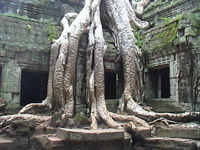 We stop for lunch at one of the many cafes; simple open, wooden framed huts, little more than gazebos, with equally simple menus of fried noodles or fried rice. Whilst the tourists eat, the moto drivers relax on the hammocks. Se talks to the other drivers, and delicately cuts the segments from an orange, dipping them in a salt and chilli paste before popping them into his mouth. His apparently mute friend with droopy, sleepy eyes sinks into his hammock and instantly falls asleep. Within seconds he is snoring.
We stop for lunch at one of the many cafes; simple open, wooden framed huts, little more than gazebos, with equally simple menus of fried noodles or fried rice. Whilst the tourists eat, the moto drivers relax on the hammocks. Se talks to the other drivers, and delicately cuts the segments from an orange, dipping them in a salt and chilli paste before popping them into his mouth. His apparently mute friend with droopy, sleepy eyes sinks into his hammock and instantly falls asleep. Within seconds he is snoring.
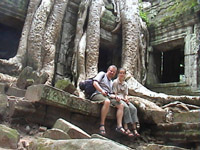 I'm talking to Lindsey, waiting for the plate of fried noodles to appear when I'm distracted by the conversation at the adjacent table between an American and a Belgian. I take out my note book and give a look that Lindsey is now familiar with. It means Please excuse me for interrupting your conversation. I don't mean to be rude but I just have to write something down otherwise I'll forget it. I knew you'd understand. She huffs and then hears what has caught my attention.
I'm talking to Lindsey, waiting for the plate of fried noodles to appear when I'm distracted by the conversation at the adjacent table between an American and a Belgian. I take out my note book and give a look that Lindsey is now familiar with. It means Please excuse me for interrupting your conversation. I don't mean to be rude but I just have to write something down otherwise I'll forget it. I knew you'd understand. She huffs and then hears what has caught my attention.
I am incredulous at what I am hearing. They want to turn Ankor into a theme park. They are waxing lyrical on changing Ankor from a place of antiquity and architectural marvel into an "Indiana Jones Village."
"Yeah" says the Belgian in tones and sentiments that are quite un-European, "we could get some rides, you know, a roller coaster around the trees"
"Maybe disappearing into one of those smiling faces we saw but with an open mouth. and then it would loop back up high and give some views over the ruins" continues the American. "Yeah, we'd get some rides and some entertainers, coz Americans can make a show and it'd be like Universal studios."
"There'd be music. Like movie music, you know..." and the Belgian dum-de-dums the Indiana Jones theme tune, "the music would be constantly playing as you go around adding to the atmosphere". "Excellent idea" says the American. "And we'd have restaurants" continues the Belgian. You'd get local food. you know, snake eyes soup, with snake eyes in it. But not real snake eyes of course"
"And we could open up a little McDonalds next door..."
And have Indy Burgers or something." They both laughed at this.
I'm serious. They were actually talking like this. I was transcribing it pretty much verbatim as they talked. And there was not a hint of irony when they spoke. I prayed to hear irony but my prayers went unanswered. These prats were serious.
"We'll build some bungalows in the middle of it all where people can stay. Ten bungalows would be sold out in a week. One travel agent in Chicago is all you need."
"You think so?"
"Damned right I think so. Hell, I know so. It's gonna be big".
Then the Belgian continued on the details. "We'd rent the temples out. We couldn't do it during the daytime, but at night when all the tourists have gone. From eight to twelve. We'd arrange Indiana Jones-type games people would play. You know, adventure challenges around the temples..."
"And we'd light camp fires" interjects the American.
"Yeah" says the Belgian who pauses then asks "how much d'you think it'll cost".
"What? to set it up?"
"Yeah,"
"Ten million dollars I reckon."
The Belgian sucks in through his teeth. "I dunno, who we'd need to talk to?"
"Stephen Spielberg" says the American proudly
"And how will we talk to him and get him to give us ten million dollars?"
"Hey" says the American. "Like I practically know the guy!"
"You do?" asks the Belgian.
"Yeah! My brother beat up his son. My brother started kicking his ass coz he tried it on with his gel."
Take me away from this place I am thinking to myself. Do these people really exist? Lindsey reads my mind and nods at me. Yes- they do exist. And then I feel a tinge of sadness because the way they are talking is the way of the West. Of marketeers and marketing jargon. We saw it in Siem Reap. The best hotel in town was being rebranded as a resort. You try and find a newly built five star hotel called a hotel; no, they are all resorts. And any good marketeer will extol the benefits of turning an attraction into an experience, and that sends a cold tingle down my spine, because that is the game I have played. When people ask me what do I do and I say IT and they say 'yeah, but what in IT?' I say 'customer experience architect' and I persuade them that it is not just about buying a product from a web site but it is all about the whole on-line shopping experience. But please God, don't let me ever talk like the American and Belgian. A web site is one thing. Please not the Ankor Experience.
Their ideas have moved on now. They have created their dream (a monstrous nightmare for me), have found funding and now they' re talking about their future success.
"I need a penthouse, coz when we are partners I'll need an apartment in Chicago."
"Hey! We'll put you in the Hancock"
"Does it have a swimming pool on the roof? I gotta have a swimming pool above my penthouse"
"Not the Hancock." The American pauses, "But hell, we'll be so rich we'll build a tower with a penthouse and a swimming pool on the roof".
"In the hills above Chicago!"
"Urrrr, there ain't any hills in Chicago." The Belgian's face drops, so the American adds "sheeet! Ya know we'll be so god-damned rich we'll build a hill in Chicago."
'Tossers' I am thinking. And am pleased when I hear the American asking for the 'check.' He pays in dollars. Clearly he hasn't been in Cambodia long for when the change arrives he asks the Cambodian waitress 'what is this?' She gives him a blank, It's-money-you-fool-what do-you-think-it-is? kind of look. The Belgian examines the notes and says "Its riel."
"What? Real? you mean real money not fake money?" they both laugh and stand up and walk off into the temple complex of Preah Khan, no doubt to find more ammunition for their Indiana Jones Village plan, more ammunition to fire at Mr. Spielberg in the quest for one hundred million dollars for their Ankor Experience with the 'Americans making a show'.
Last words
Every stop on the route around Ankor was greeted by a cacophony of 'you buy from me' 'Sir you buy water' 'you buy t-shirt/soft drink/ guidebook/ etc/ etc." "No" wasn't an answer the mostly women and children souvenir vendors and purveyors of tourist paraphernalia and tourist tat seemed to understand. And "maybe later" meant a pause of thirty seconds before later became now. I learnt how to say 'no thank you, not today' in Khmer and this worked a treat. Immediate silence and they'd go and bother another tourist. It must be hard for them though. Whilst there are hundreds of tourists here, the usual answer to 'sir, you buy embroidered bag from me' must be "no".
One persistent woman persisted in her patter. "You buy embroidered bag for your sister"
"I don't have a sister".
"For your girlfriend"
"She is my wife"
"For your wife then"
"She doesn't want one. Do you Lindsey?"
"No! (although that blue one behind the white one looks quite nice)" Lindsey whispers. "Arrr, your wife likes the blue one" and the blue embroidered bag is thrust into Lindsey's hand. Lindsey hates being pressured and this instantly turns her interest into dislike. "No, I don't like it. No really, I don't want it thank you" she tries with little success to hand it back. "I really don't want it thank you." Time for the well rehearsed no thank you in Khmer. "Te aw kon"
"you speak Khmer?"
"No, only enough to say no thank you." She laughs. This woman is persistent but pleasant. She has a delicious grin and a sense of humour. "How many bags do you sell in a day" I ask her.
"Maybe two or three" she replies, "much competition". I look around, and there are four other women pushing embroidered bags at tourists at this one site. She will get a dollar for each bag, maybe more from tourists whose haggling skills are not so well developed. Still, sell only two a day, sixty a month and she will earn more than double the average monthly Cambodian wage.
We have just bought a bottle of water from one of the 'sir you buy water' touts and are sitting down on some steps looking over Ankor Wat and enjoying our last moments here. We are talking about what we have seen, about the stories Se told me- the French Minister for Culture who in his younger days tried to steal many of the monuments. Of the Khmer Rouge killing the workers and destroying the plans of the temple they were rebuilding, leaving a massive million piece stone jigsaw puzzle for the restorers to later complete. And we are talking and then we get up to leave. To say good bye to Ankor Wat. And I stand up and I don't see the low hanging stone detail that protrudes from the balustrade over the staircase and as I stand up, I walk straight into it and crack my head against it and fall to the floor. And shout out in pain.
I asked Lindsey what I shouted because it must have knocked me out and I couldn't remember. I could only remember the pain and shouting something. I thought this may give me an insight into what my last words might be. I mean something dignified like Ghandi when he was shot and his last words were "Oh God". Or maybe a humorous 'ouch' or a practical 'I've banged me head,' or something less dignified from the vocabulary that is used sparingly, like 'bloody hell' or the more fatalistic 'oh shit'. But no. It is with great sadness and regret that my cry of pain was with the second most offensive of swear words.
I now tell myself that I've got to work on my last words because in this rehearsal I fell to the ground in pain with everyone listening and looking and I got it dreadfully wrong. If it had been my final last word it would have been 'fuck!'
